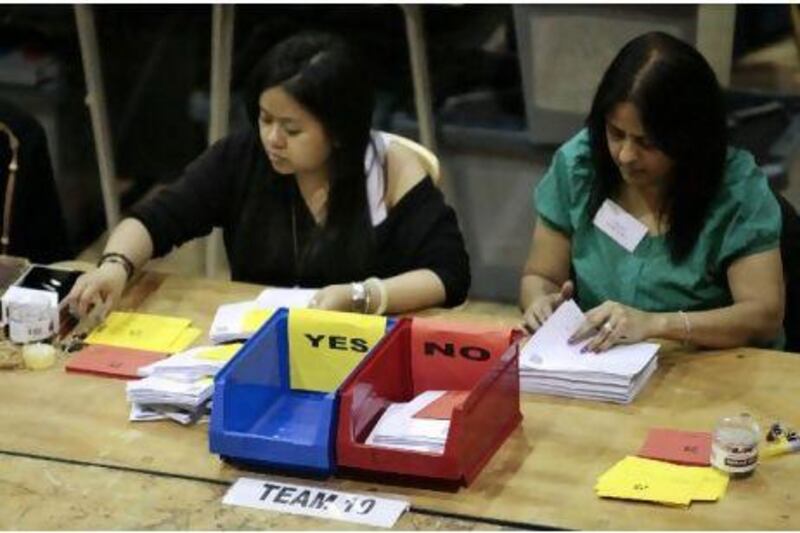LONDON // Britons' overwhelming rejection of a move to reform the country's voting system cast fresh doubts yesterday over the long-term chances of survival for the country's coalition government.
Although the Conservative prime minister David Cameron and his Liberal Democrat deputy, Nick Clegg, went out of their way to insist it would be business as usual, ever-loudening voices from the respective parties' supporters suggested it might be anything but.
The results emerged overnight yesterday of Thursday's nationwide referendum on a proposal to ditch the traditional, first-past-the-post system at general elections and replace it with one called the alternative vote (AV), under which the electorate could rank candidates in order of preference.
By a 68 per cent to 32 per cent majority, AV was rejected after more than 19 million voters went to the polls.
Mr Clegg's Liberal Democrats, who backed AV and saw it as a first step to getting proportional representation introduced in Britain, had made the holding of the referendum an essential part of the agreement that led them into coalition with the Conservatives a year ago.
The rejection of AV - after a bitter "No" campaign funded by the Conservatives - came little more than 24 hours after the Liberal Democrats had suffered near oblivion in local and regional elections across the country.
A combination of the two disasters is now causing the party's faithful to question whether the price of being the junior coalition partner is not far too high.
Calls from rank-and-file members for Mr Clegg to step down have been rejected by the party's hierarchy. At the same time, however, senior figures have made it clear that Liberal Democrat ministers will be far more assertive in future policy disagreements in cabinet.
Simultaneously, several right-wing Conservatives are saying that their party has already made too many concessions to the left-of-centre Liberal Democrats and should not make any more.
Bill Cash, a senior Conservative backbencher, suggested that people who thought the coalition could continue as usual were living in "cloud cuckoo land".
He added: "The truth is, the Liberal Democrats have had an absolute thrashing and people voted 'c' for Conservative, not for coalition."
Bernard Jenkin, a member of the Conservatives' influential 1922 Committee in parliament, also suggested that the government should stop making concessions to the Liberal Democrats.
"We went into this coalition for good or ill, and we made our concessions to the Liberal Democrats," he told the BBC yesterday.
"One of those concessions was the referendum. We have now had the referendum and, just because the referendum went a particular way not suiting the Liberal Democrats, it seems extraordinary that, effectively, we have got to start reopening the coalition agreement."
Vince Cable, the business secretary in the government and one of the most influential Liberal Democrats, attacked Conservatives yesterday as "ruthless, calculating and very tribal" but insisted the coalition would continue.
He told the BBC News Channel: "The basic reason for going into coalition wasn't electoral reform, but the economic crisis. We still have one.
"The Conservatives have emerged (in the AV campaign) as thoroughly ruthless, calculating and very tribal, but we have to work with people who aren't our natural bedfellows."
Few doubt that the coalition will soldier on, with increasing difficulties, in the short term. There are now increasing doubts, though, that it will survive its full, five-year term.






